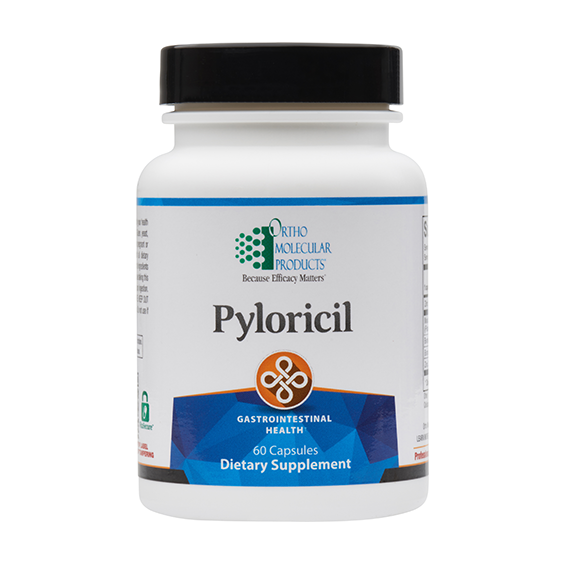
Ortho Molecular Pyloricil - 60 ct
Regular price
$64.40
Sale
Ortho Molecular's Pyloricil includes ingredients such as mastic gum, bismuth citrate and zinc carnosine to promote microbial balance in the gastrointestinal tract and the stomach.
Pyloricil provides zinc carnosine, a zinc complex of L-carnosine approved in Japan since 1994 for its use in stomach health; mastic gum, traditionally used to protect the stomach lining and shown in studies to promote microbial balance; bismuth citrate, used to promote normal bacterial growth, and for its soothing action on the gastric and mucosal lining; and berberine sulfate, a compound with microbial-balancing properties.
Mastic Gum: Mastic gum is a resinous product which is obtained from the stem and leaves of the mastic tree (Pistacia lentiscus). The mastic tree is an evergreen shrub native to the Mediterranean Basin and has historically been used to support the health of the stomach. In a double-blind study, 60 patients randomly assigned to receive mastic (1 g/ day), or placebo, for two weeks demonstrated that mastic gum supported the health of the stomach lining in 78% of the patients in the control group (versus 22% of those receiving placebo). Mastic gum has also been shown to promote healthy microbial balance in the GI tract.
Bismuth Citrate: Bismuth citrate is a naturally occurring mineral, frequently used to soothe the gastric and mucosal linings. Bismuth citrate also promotes microbial balance in the GI tract. Bismuth citrate offers a key advantage when compared to other bacterialbalancing therapies. While it is very common for bacteria to develop a resistance to various bacterial-balancing agents, it is unlikely they will develop resistance to bismuth citrate.
Zinc Carnosine: Zinc carnosine has been approved in Japan since 1994 for its use in stomach health. The health-promoting effects of zinc are enhanced significantly when combined with the essential nutrient, carnosine. Japanese scientists have led the way in developing this zinc carnosine compound, which combines zinc and carnosine linked by a chemical bond. Research has demonstrated that zinc carnosine stabilizes the mucosal lining of the stomach and small intestines. In a study examining the effects of zinc carnosine on animal digestive tracts, following exposure to indomethacin or to stress, this nutrient combination was shown to support gastric and intestinal health by stimulating the migration and growth of cells. In the human clinical trial based on the same model, 10 healthy volunteers consumed indomethacin (50 mg three times daily) along with placebo, or zinc carnosine. Indomethacin increased gut permeability (impaired barrier function of the gut’s lining) by a factor of three in the placebo group. As compared to the placebo group, the control group consuming zinc carnosine showed no increase at all in gut permeability.
Berberine Sulfate: Berberine sulfate is a botanical extract found in the roots and barks of various plants including Oregon grape root (Berberis aquifolium), barberry (Berberis vulgaris) and goldenseal (Hydrastis canadensis). Berberine has a long history of use in both Ayurvedic and Chinese medicine. Berberine sulfate has been shown to promote healthy microbial balance in the GI tract and maintain normal inflammatory balance throughout the body.
Does Not Contain: Gluten, yeast, artificial colors and flavors.
